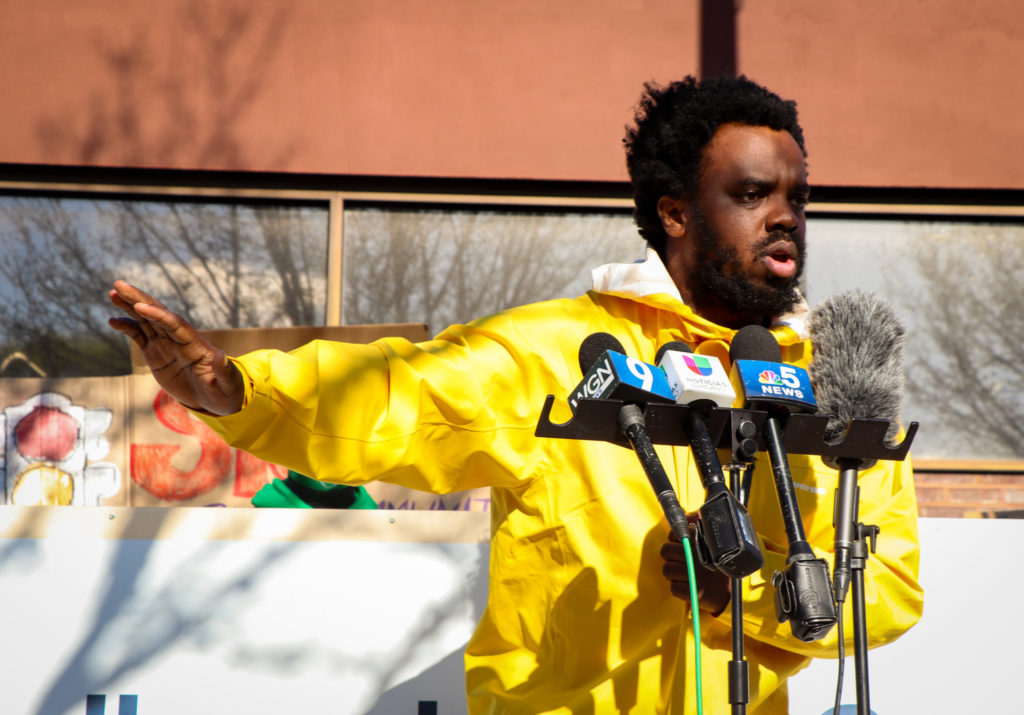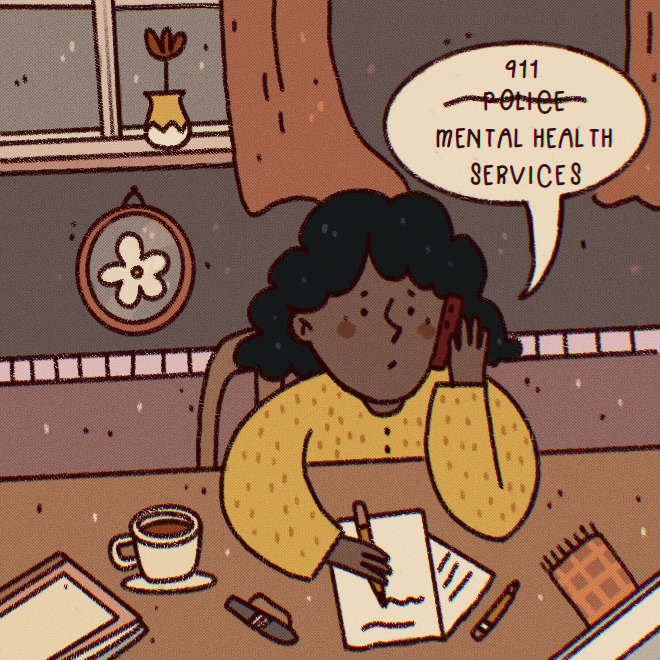After she lost her son in 1996, Diane Adams sought help from the Auburn Gresham Mental Health facility, where she started seeing a therapist and a psychiatrist. “He taught me ‘bout my medicine, and ‘bout my illness,” she said of her therapist. “And once he did that, then I start making goals for myself. And all the goals I made, I achieved them all.”
“It was to make sure I get back in Bible class. That I can stay in church. I wanted my own place. I stopped smoking. I had a dog,” she continued, itemizing her goals. A few years after Adams started going to the clinic, she began psycho-social rehabilitation, “where they teach you how to live back into the community.” She attended the clinic as many as five days a week until it was halted at the onset of the COVID-19 pandemic.
When the Auburn-Gresham Mental Health facility was closed during Rahm Emanuel’s administration in 2012, along with five more of the city’s twelve public mental health clinics, Adams followed her therapist to the Englewood Mental Health Center. But she had fought for the six facilities to remain open.
In April of 2012, she was one of twenty-three people arrested for barricading herself inside the Woodlawn Mental Health Clinic to protest the planned closures. While fighting the closures, she joined Southside Together Organizing for Power (STOP), where she has been advocating for the reopening of the public mental health facilities ever since.
“You know that during this pandemic a lot of people is going through a whole lot, especially the ones that have mental illness that can’t get out. They homebound,” she said. “See, when the pandemic come to an end, [we’re going to] need these clinics.”

The mayor’s plan to outsource instead of rebuild
During her campaign, Mayor Lori Lightfoot promised to reopen the shuttered public mental health facilities. She has since gone back on that promise, instead announcing in 2020 that thirty-two existing organizations providing mental health services would receive $8 million to expand their capacity. But many advocates have pushed back, arguing that outsourcing these services to private organizations is not the same as reinvesting that money into public mental health.
Advocates say the need for public mental health services now is greater than ever. According to the Collaborative for Community Wellness’s 2021 report, which surveyed 378 respondents across the city, sixty-three percent reported symptoms of anxiety and fifty-six percent reported symptoms of depression.
While ninety percent of the respondents responded “yes” or “probably yes” to whether they would go to a City-run mental health clinic in their neighborhood that offered free services, seventy-three percent of the respondents did not know the City of Chicago still operates five mental health clinics.
“What we know is that, because they have razor thin margins, a lot of these health centers, that the additional money could just be used to supplant the existing operations and the existing staffing. So the concern, of course, is that you’re not necessarily able to add capacity,” said Dr. Arturo Carrillo, a licensed clinical social worker, the lead organizer for the Collaborative for Community Wellness, and the director of Health and Violence Prevention at Brighton Park Neighborhood Council.
In contrast, those $8 million dollars could have created fifty clinical positions and reopened the public facilities, he said.
Critics also note that outsourcing mental health services to the private and non-profit sectors makes accountability difficult. “Right now, I cannot go up to a private provider or a nonprofit provider and ask ‘how many people are you serving, what are you doing?’ That’s not open record, that’s not public information,” said 25th Ward Alderman Byron Sigcho-López. “There has to be accountability to make sure that we are able to see where we are in terms of needs, where we are in terms of addressing this issue of mental health, and public accountability is key.”
“The public mental health clinics, to this very day, have a community mental health board advisory council,” explained Carrillo. “That’s open to the public. Consumers, advocates are part of that space. And there’s a direct line of communication between the public and administrators of public health to share information to take input from the public.”
Carrillo said that he understands that many people are happy with the services they receive from their non-profit or private provider. “If doing behavioral health appointments at your clinic works for you, then great, keep doing that, no one’s taking that away,” he said.
But public mental health facilities are also unique in that they are meant to serve everybody, whether or not they have health insurance, and provide a wide range of services, including long-term, trauma-focused care. Not all non-profit or private providers provide this type of care.
“What we are saying is that also, if it’s not working for you, you shouldn’t have to change your clinic to start switching for mental health provision,” said Carillo. “You should have the option to walk, like you do currently, to your library—it’s a public setting, a public institution—and say this is the service I need and when can I see your therapist?”
Building mental health services into public infrastructure also can also shore up their longevity. “We’re talking about building up the City’s public infrastructure so that people have the facilities they need, not only in the short term but in the long term,” explained Dixon Romeo, campaigns director for United Working Families and a member of the Right to Recovery coalition, made up of more than thirty organizations and a dozen elected officials.
“The way that you ensure that it becomes part of the fabric of our communities is by—just like the libraries and the school system and firehouses—you build them into the operations of the City,” said Carrillo.
A call for social workers instead of police
In addition to pushing for Lightfoot to reopen the closed public mental health facilities, advocates are demanding that the City fund the Treatment Not Trauma non-police crisis response pilot. This model would send a clinical social worker and an EMT or registered nurse, instead of police officers, to respond to mental health crisis calls received by 911. It is inspired by a thirty-one-year-old program in Oregon, and is being planned in cities like San Francisco, Oakland, Albuquerque, and Denver.
Advocates say that this plan is urgent, citing the high number of incidents of police violence in response to mental health crises; in Chicago in 2018, WBEZ reported, there were 150 mental health calls a day to 911. And nationally, at least twenty-five percent of people killed by police have been diagnosed with a severe mental illness.
“Imagine when you have—especially now we see the multiple issues of police brutality cases—to call the police for a mental health issue,” said Sigcho-López. “As a mother, as a father, as a sibling, as a family member or friend, you’re not going to put anyone at risk. It’s a model that does not work.”
The proposed Treatment Not Trauma ordinance was introduced in September 2020 by 33rd Ward Alderwoman Rossana Rodríguez Sánchez. It urges the City to develop a publicly funded Chicago Crisis Response and Care System within the Chicago Department of Public Health (CDPH), with twenty-four-hour crisis response teams staffed by a clinical social worker and an EMT or registered nurse. But Lightfoot countered with a separate plan that called for a co-responder model, which would send a police officer along with a social worker to respond to 911 calls involving a mental health emergency.
“That sort of crisis response model has been tried in other cities, and most cities have started walking away from that model because there really isn’t a need for police to be present in crises,” said Carrillo.
Advocates and aldermen pushed for a non-police element to Lightfoot’s plan within the 2021 budget and received a concession. Instead of two co-responder teams, the City will now have two crisis response teams—two staffed with police and two without.
This program is supposed to go into effect in June, according to Carrillo. But advocates are continuing to lobby for $5 million for the pilot to operate out of two public mental health facilities, with the ultimate goal of expanding it to the entire city.
Advocates push for federal relief funding to address a dire need
When Chicago received $480 million in discretionary federal CARES Act funding, Lightfoot gave $281 million to the Chicago Police Department. Now, the City is about to receive $1.9 billion in unrestricted funding through the American Rescue Plan, and advocates are asking for $25 million to be spent on reopening the closed public mental health facilities and expanding the crisis response program. The Right to Recovery coalition has posted a survey asking Chicagoans where they would most like to see funding directed.
The disparities in mental health services across the city are stark—according to a study conducted by the Collaborative for Community Wellness in 2018, the number of clinicians in the Gold Coast is 4.45 per 1,000 residents, whereas on the Southwest Side, it is 0.17 per 1,000 residents. According to the most recent Census data, about ten percent Chicagoans have no health insurance.
After the 2019 aldermanic elections, the aldermen who were proponents of reopening the clinics were able to gain concessions by holding up the nomination of Commissioner of Chicago Department of Public Health Dr. Allison Arwady. Among them were $2 million for the existing public mental health clinics to “get them to be baseline operational,” Carrillo said, as well as half a million dollars to promote the public mental health clinics to communities at risk.
“So the money was there for the funding to be utilized in 2020 to promote the public mental health clinics at probably, you could argue, the most necessary time, during the pandemic, for people to know about these mental health clinics. And they chose not to do so. The money was on the table,” he said.
“That’s a real failure of leadership.”
Madeleine Parrish grew up in New Jersey and is currently a University of Chicago political science undergraduate. She last wrote about vaccines in Chicago homeless shelters.

